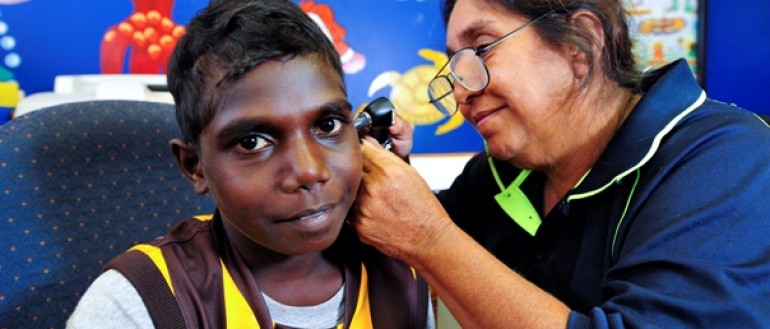Objectives:
In Indigenous children up to six years of age living in remote communities of the Northern Territory (NT) and in Western Australia, during 2013:
- To compare the prevalence of ear disease (any otitis media) with previous cohorts
- To compare the prevalence of tympanic membrane perforation (TMP) with previous cohorts
- To compare nasopharyngeal pneumococcal carriage (any pneumococcal carriage) with previous cohorts
- To compare nasopharyngeal pneumococcal serotype-specific carriage (any serotype 3, 6A or 19A) with previous cohorts.
Summary:
Indigenous children in remote communities have high rates of otitis media caused by non-capsular H. influenzae (NTHi) and pneumococci. Pneumococcal conjugate vaccine, PCV7, has effectively reduced disease caused by the seven serotypes. Rates of non-vaccine serotype otitis media (OM), particularly 19A is increasing, and NTHi continues to be a major pathogen in perforations. Parallels with pneumonia are highly probable in this population. Vaccines with expanded and early age protection are needed.
Rationale:
Impact of PCV7: direct and indirect effects on IPD, pneumonia, OM and carriage
Pneumococcal conjugate vaccines (PCVs) have eliminated the majority of pneumococcal disease and nasopharyngeal carriage caused by the vaccine serotypes, including those serotypes resistant to antibiotics. In Australia in 2007, PCV7 types (4,6A,9V,14,18C,19F,23F) caused less than 10% IPD cases. Additional indirect benefits include reduced transmission and thus less disease in the non-vaccinated community.
Replacement by non-PCV7 serotypes: IPD
Globally and in Australia, there has been an increase in rates of disease caused by non-vaccine serotypes (replacement disease), predominantly serotype 19A (causing 40% cases) but also 22F, 6A, 11A, 33F and 7F. For Indigenous children less than two years of age, the 2007 IPD incidence remained higher (~80 per 100000) than incidence in non-Indigenous children (~20 per 100000), and almost all cases were caused by 19A.
Replacement by non-PCV7 serotypes: nasopharyngeal carriage, otitis media and pneumonia
The Northern Territory (NT) Indigenous population also has very high rates of non-bacteraemic pneumonia and otitis media. Otitis media is at crisis level with 45% young children having tympanic membrane perforations (TMP) in the first two years of life. Currently, the dominant carriage and TMP serotypes are 16F, 19A and 19F, followed by 10A, 11A and 6C. Non-typeable H. influenzae is a major pathogen of otitis media, TMP and possibly chronic suppurative lung disease in the NT.
Monitoring nasopharyngeal carriage and otitis media
The current surveillance of invasive pneumococcal disease (IPD) plays a critical role in informing vaccine policy in Australia. There is, however, an important complementary role for surveillance of nasopharyngeal carriage. This has the potential to rapidly provide a large amount of information on serotype-specific carriage (and antimicrobial susceptibility profiles) in specific population groups.
We incorporated surveillance of otitis media, using standardised clinical assessments (video-otoscopy and tympanometry), with WHO standardised methods for surveillance of nasopharyngeal carriage in remote Indigenous communities and in urban kindergartens (90% non-Indigenous) since 2001 when PCV7 commenced in the Northern Territory, which was funded by Wyeth (2001 to 2004).
Ongoing surveillance of OM and carriage has been financed by NHMRC (2003 to 2005 and 2008 to 2010) and GSK before (2008/9) and after (2011/12) the NT vaccination schedule changed to Synflorix.
In 2011, PCV13 replaced PCV7 in the National Immunisation Program, and Synflorix in the NT childhood vaccination schedule. Whether ongoing replacement disease by other serotypes or pathogens is likely to occur is extremely important and may be predicted by carriage surveillance. Improved understanding of pneumococcal population biology is needed, to capture impacts of these vaccines and to inform new strategies in vaccine design.
Chief investigators:
Project manager:
- Chris Wigger
Funders:
- Pfizer

